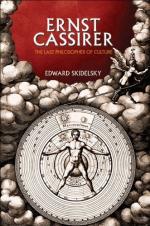|
This section contains 8,689 words (approx. 29 pages at 300 words per page) |

|
SOURCE: "Ernst Cassirer's Contribution to Literary Criticism," in The Philosophy of Ernst Cassirer, edited by Paul Arthur Schlipp, The Library of Living Philosophers, Inc., 1949, pp. 663-88.
In the following essay, Reichardt explores the implications of Cassirer's writings for literary criticism.
In his Essay on Man, Cassirer—in the form of a paradox—defines the historian's aspiration as "objective anthropomorphism." Whereas the process of scientific thought shows a constant effort to eliminate "anthropological" elements, history appears not as a knowledge of external facts or events, but as a form of self-knowledge: man constantly returns to himself attempting to recollect and actualize the whole of his past experience. The historical self, however, aspires to objectivity and is not satisfied with egocentricity. In his discussion of the various methods of historical research Cassirer expresses greatest warmth when speaking of the work of Ranke, who once voiced the desire to extinguish his...
|
This section contains 8,689 words (approx. 29 pages at 300 words per page) |

|


